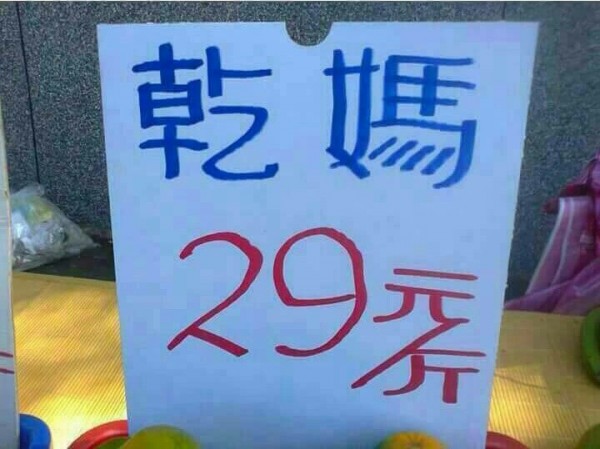More sound-loan Taiwanese
« previous post | next post »
Michael Cannings sent in this photograph:
(Source)
The product for sale at 29 yuan per catty is not gānmā 乾媽 ("godmother" in Mandarin) but rather kam-á 柑仔 ("tangerine" in Taiwanese). They have borrowed the Mandarin near-homophone gānmā 乾媽 ("godmother") to write the Taiwanese kam-á 柑仔 ("tangerine").
Heaven forbid that one should say or think gànmā 幹媽 ("'do' [your] mother") when reading gānmā 乾媽 ("godmother" < "dry + mother") — they both would be written as 干妈 in simplified characters.
Cf. these recent posts:
"Madame Curry" (2/1/16)
"Strong language" (1/29/16)
And none of this has anything to do with "gànma 幹嘛 / 干嘛?" ("why?") or gànmá 幹嗎 / 干吗 ("why on earth? whatever for? what's going on? what's wrong? what are you doing? what's up? what to do?"). N.B.: some speakers insist on keeping these two interrogatives separate, but others collapse them into one.

Chris C. said,
February 3, 2016 @ 9:55 pm
This is a good example of why tonal languages frighten me.
Gene Anderson said,
February 4, 2016 @ 11:39 am
"little gold ones"–that wonderful all-purpose Hokkien diminutive "-a."
Greg said,
February 4, 2016 @ 12:12 pm
@VM What's your thought on the impetus for this? 柑仔 is fewer strokes than 乾媽, so the substitution seems odd on a written sign. Is it cutesy? Fashionable? Representative of some shift in the relationship between Mandarin and Hokkien in Taiwan?
Victor Mair said,
February 4, 2016 @ 1:27 pm
Good question, Greg.
My immediate response is that kam-á 柑仔 ("tangerine") is overtly marked as Taiwanese, which the vendor might have felt would be off-putting to Mandarin speakers. Add to that the cuteness of the pun, and writing it as gānmā 乾媽 ("godmother") must have been nearly irresistible.
See also my next post on the Golden Monkey, especially the last line.
Michael Cannings said,
February 4, 2016 @ 5:29 pm
I imagine the vendor is having a bit of fun. Taiwanese people do love a bit of wordplay.
Joyce Melton said,
February 5, 2016 @ 12:40 am
The other joke is that a tangerine is a kind of mandarin orange.
Joel Chang said,
February 7, 2016 @ 10:56 am
Did you run into this one before?
http://4.bp.blogspot.com/-qXepsbQFO9Q/U7KIU80th3I/AAAAAAAAW48/Kh-_gIst_jI/s1600/10393794_793382020693891_7207583108637297985_n.jpg
Lim said,
February 7, 2016 @ 11:48 am
The Mandarin word 幹嗎 is not used in Taiwan.